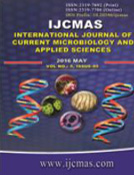


 National Academy of Agricultural Sciences (NAAS)
National Academy of Agricultural Sciences (NAAS)

|
PRINT ISSN : 2319-7692
Online ISSN : 2319-7706 Issues : 12 per year Publisher : Excellent Publishers Email : editorijcmas@gmail.com / submit@ijcmas.com Editor-in-chief: Dr.M.Prakash Index Copernicus ICV 2018: 95.39 NAAS RATING 2020: 5.38 |
Recently, in different countries of the world, attention has been paid towards exploitation of higher plant products as novel chemotherapeutants in plant protection. The antifungal activity of aqueous extracts of Garlic (Allium sativum, L.); Black pepper (Piper nigrum L.); Black cumin (Nigella) (Nigella sativa L.); Cinnamon (Cinnamum zeylanicum);Clove bud (Dianthus caryphlus L.); and Ginger (Zingber officinalis, L.) was investigated for controlling Monosporascus cannonballus sudden wilt disease of watermelon plants at two concentrations i.e., 1 and 5%. The pathogenic fungus isolates have been isolated from infected plant parts and identified on the basis of their morphological and cultural characteristics. All the plant extracts showed considerable diminution of sudden wilt disease infection on watermelon plants under greenhouse conditions. Garlic followed by Clove bud extracts were the most effective in disease control. Significant differences were noticed between all tested plant extracts and their used concentrations in infested pots by three highly pathogenic isolates. Also, essentialoil of Garlic, Cinnamon bud, Marjoram (Origanum majorana L.), and Black pepper were used in controlling the same disease of watermelon plants. Drenching soil with plant oils suspension in all used concentrations decreased sudden wilt disease parameters of watermelon plants cv. Giza 1 that sown in pots infested with one of the three virulent isolates of M. cannonballs in comparison to control. Suspensions of Garlic oil followed by Black pepper oil were affected and decreased disease parameters as well as the inhibition of disease were increased by increasing of plant oil concentrations. Comparative studies were done in controlling sudden wilt disease of watermelon plants using three chemical fungicides, i.e. Rizolex T., Rofral and Bellis. The fungicide Bellis was more effective in controlling disease infection; also increasing fungicide concentration up to 1000 ppm was more effective in disease control. The application of botanical extracts for disease management could be less expensive, easily available, non-polluting and eco-friendly.
 |
 |
 |
 |
 |